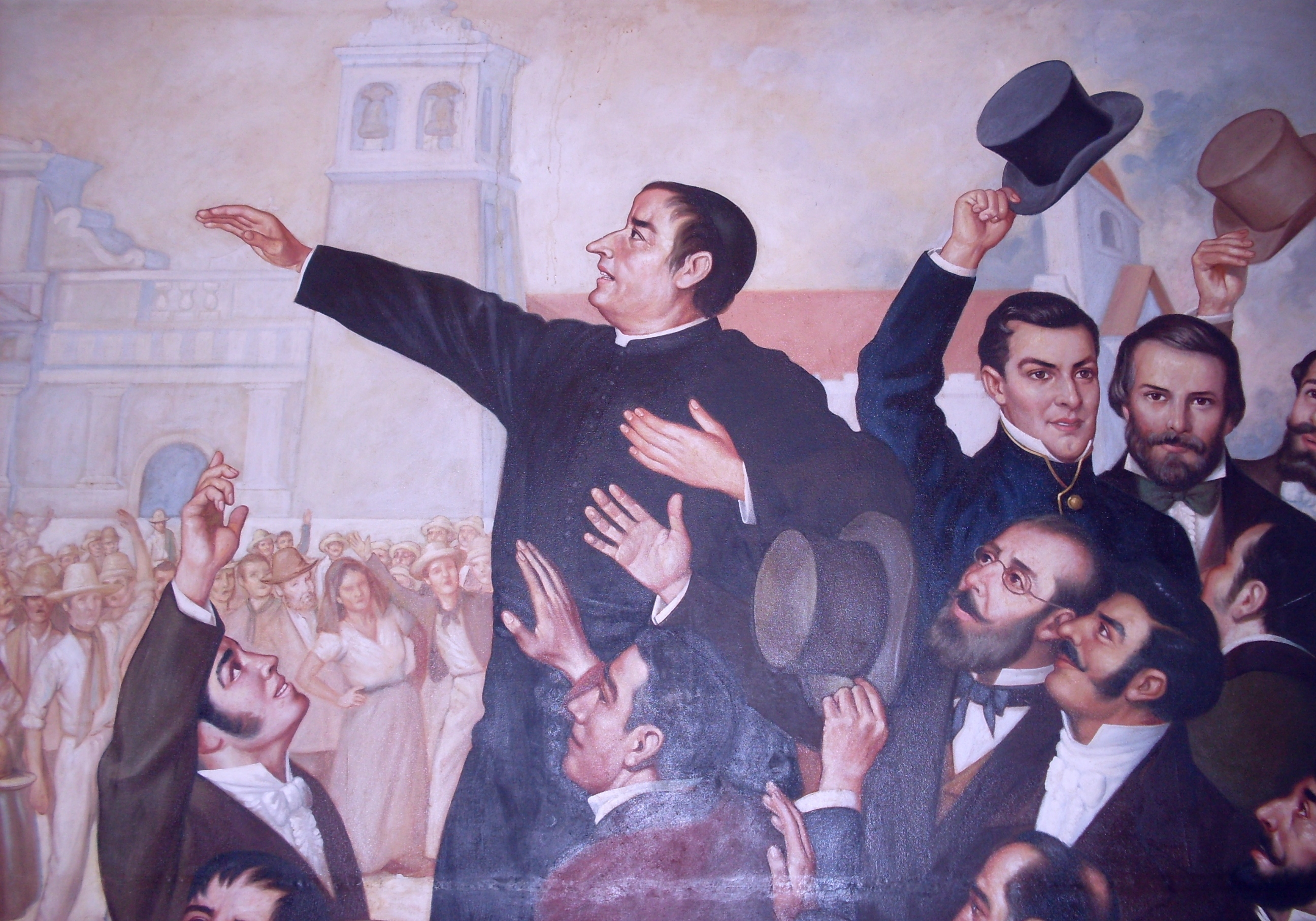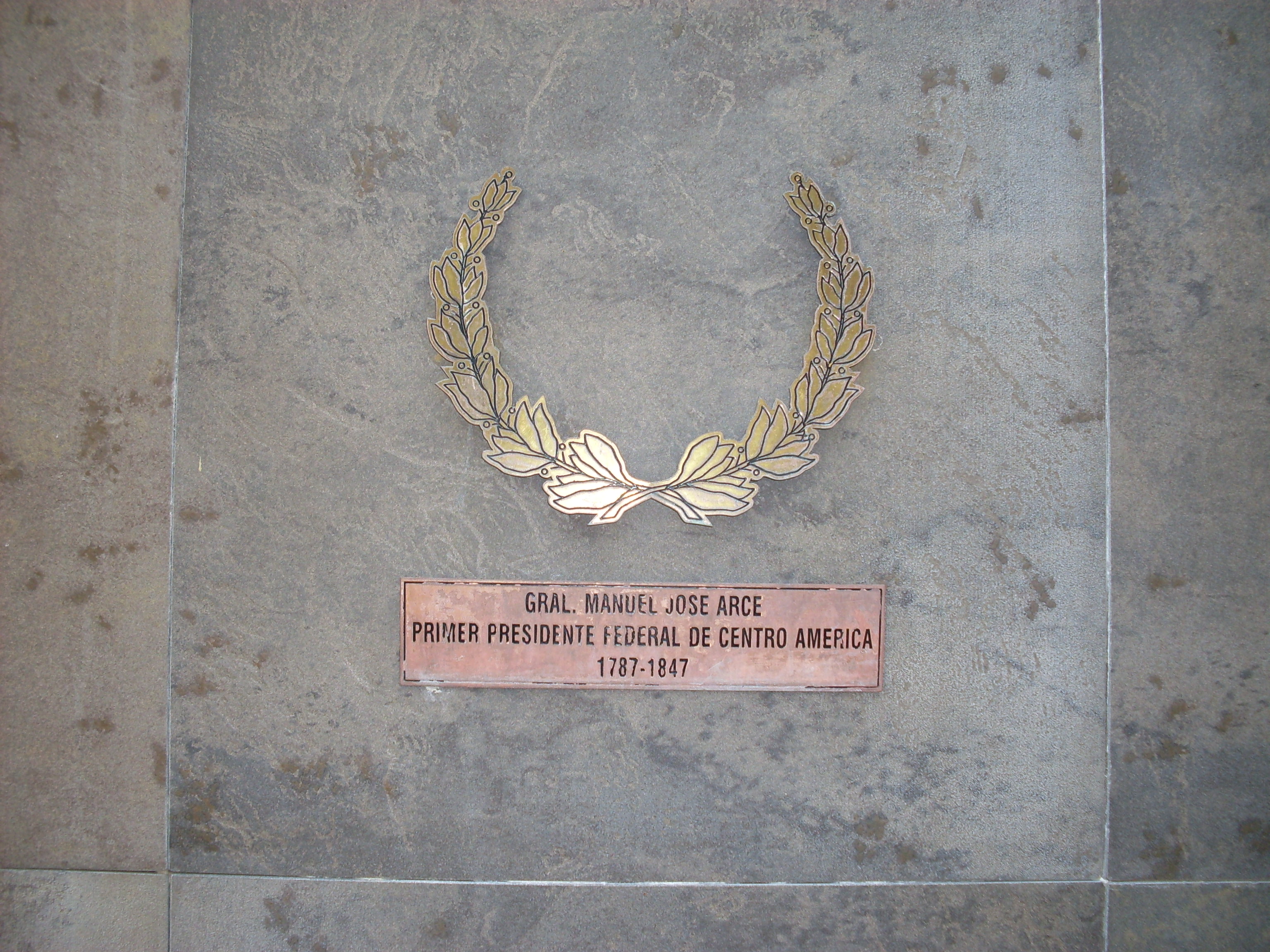Manuel José Arce on:
[Wikipedia]
[Google]
[Amazon]
Manuel José Arce y Fagoaga (1 January 1787 – 14 December 1847) was a decorated
 He strongly opposed the
He strongly opposed the
 Presidential elections were held in 1825, and
Presidential elections were held in 1825, and

 Arce died in poverty in San Salvador on December 14, 1847. His remains were interred at La Merced Church in San Salvador. On November 28, 1947 the Legislature elevated the town of El Chilamatal to a city, renaming it in the process city of
Arce died in poverty in San Salvador on December 14, 1847. His remains were interred at La Merced Church in San Salvador. On November 28, 1947 the Legislature elevated the town of El Chilamatal to a city, renaming it in the process city of
Short biography
*
Some background information
from Britannica Online {{DEFAULTSORT:Arce, Manuel Jose 1786 births 1847 deaths Universidad de San Carlos de Guatemala alumni Heads of state of the Federal Republic of Central America Salvadoran people of Spanish descent Salvadoran independence activists
salvadoran
Salvadorans (Spanish: ''Salvadoreños''), also known as Salvadorians (alternate spelling: Salvadoreans), are citizens of El Salvador, a country in Central America. Most Salvadorans live in El Salvador, although there is also a significant Salvad ...
General
A general officer is an officer of high rank in the armies, and in some nations' air forces, space forces, and marines or naval infantry.
In some usages the term "general officer" refers to a rank above colonel."general, adj. and n.". OED ...
and president of the Federal Republic of Central America
The Federal Republic of Central America ( es, República Federal de Centroamérica), originally named the United Provinces of Central America ( es, Provincias Unidas del Centro de América), and sometimes simply called Central America, in it ...
from 1825 to 1829, followed by Francisco Morazán
José Francisco Morazán Quesada (; born October 3, 1792 – September 15, 1842) was a Central American politician who served as president of the Federal Republic of Central America from 1830 to 1839. Before he was president of Central America h ...
.
Background
Manuel José Arce was the son ofSpaniard
Spaniards, or Spanish people, are a Romance ethnic group native to Spain. Within Spain, there are a number of national and regional ethnic identities that reflect the country's complex history, including a number of different languages, both i ...
Bernardo José de Arce, the Colonial Intendant of the Intendancy of San Salvador from 1800 until 1801, and Antonia Fagoaga. He was born in the Intendancy of San Salvador, what is now El Salvador. In 1801 he was sent to Guatemala to continue his education. There he graduated in philosophy from the Colegio de San Francisco Borja. He began the study of medicine at the Universidad de San Carlos de Borromeo, but it was interrupted because of his father's sickness. In December 1808, he married Felipa de Aranzamendi y Aguiar in San Salvador.
Independence movement
Arce joined the movement for independence from Spain, joining in the first ''Cry for Independence'' on November 5, 1811 in San Salvador. It was led by his uncle, José Matías Delgado, the vicar of San Salvador. The rebels held the government for nearly a month before royal authority was restored from Guatemala. Arce was also involved in the second uprising that began January 22, 1814. This cost him four years in prison.Mexican Empire Mexican Empire may refer to:
* First Mexican Empire, the regime under Agustín de Iturbide (Agustín I) from 1821 to 1823
* Second Mexican Empire
The Second Mexican Empire (), officially the Mexican Empire (), was a constitutional monarchy est ...
of Agustín de Iturbide and its efforts to annex Central America. In April 1822 Manuel Arzú, in command of Guatemalan troops supporting Mexico
Mexico (Spanish: México), officially the United Mexican States, is a country in the southern portion of North America. It is bordered to the north by the United States; to the south and west by the Pacific Ocean; to the southeast by Guatema ...
, occupied the cities of Santa Ana, El Salvador, and Sonsonate
Sonsonate () is a city and municipality of El Salvador. It is the capital of the department of Sonsonate; on the Sensunapan River and the Pan-American Highway from San Salvador to the Pacific port of Acajutla
Acajutla is a seaport city in Sons ...
. On June 3, 1822, Arzú entered San Salvador, reaching the Plaza Mayor. Nine hours of fighting resulted in many casualties and burned houses. Colonel Arce was one of the commanders of the Salvadoran defenders.
Arce was also a member of the resistance towards the movement that was requesting annexation to the United States
The United States of America (U.S.A. or USA), commonly known as the United States (U.S. or US) or America, is a country primarily located in North America. It consists of 50 states, a federal district, five major unincorporated territori ...
. The government of El Salvador had requested annexation to the United States on December 2, 1822.
In October 1823 he left the United States to return to El Salvador. He stopped in Mexico. There he tried to raise a force to liberate Cuba
Cuba ( , ), officially the Republic of Cuba ( es, República de Cuba, links=no ), is an island country comprising the island of Cuba, as well as Isla de la Juventud and several minor archipelagos. Cuba is located where the northern Caribbea ...
from Spanish rule but it failed.
As president
Also in October 1823 he was elected a member of the executivetriumvirate
A triumvirate ( la, triumvirātus) or a triarchy is a political institution ruled or dominated by three individuals, known as triumvirs ( la, triumviri). The arrangement can be formal or informal. Though the three leaders in a triumvirate are ...
of Central America
Central America ( es, América Central or ) is a subregion of the Americas. Its boundaries are defined as bordering the United States to the north, Colombia to the south, the Caribbean Sea to the east, and the Pacific Ocean to the west. ...
. He accepted this post on March 15, 1824 on his return to the country, serving until October 20, 1824. During this time the government succeeded in pacifying Nicaragua
Nicaragua (; ), officially the Republic of Nicaragua (), is the largest country in Central America, bordered by Honduras to the north, the Caribbean to the east, Costa Rica to the south, and the Pacific Ocean to the west. Managua is the countr ...
, with a minimum of violence.
 Presidential elections were held in 1825, and
Presidential elections were held in 1825, and José Cecilio del Valle
José Cecilio Díaz del Valle (November 22, 1780 – March 2, 1834) was a philosopher, politician, lawyer, and journalist and one of the most important figures in Central America during the transition from colonial government to independenc ...
won the most votes. The Liberals, however, controlled the federal Congress, and they decided that Valle had not won an absolute majority. They chose Arce as president. He served from April 29, 1825 to April 13, 1829.
He soon lost the support of the Liberals in Congress. After 1826 neither house of the federal Congress met. Arce obtained some support from the clergy and the Conservative Party, but there were difficulties with the State of Guatemala. He deposed the Guatemalan state governor, Juan Barrundia, a Liberal, and replaced him. The Salvadoran state government was angry and rebelled, and a civil war
A civil war or intrastate war is a war between organized groups within the same state (or country).
The aim of one side may be to take control of the country or a region, to achieve independence for a region, or to change government policies ...
started that lasted from 1826 to 1829. On 1829 Arce called Vice President Mariano Beltranena y Llano to temporarily exercise the presidency, but when Arce wanted to resume it, Beltranena refused and remained in office until April 1829 when the liberals troops entered Guatemala City and overthrew his administration.
Later life
In 1832 he was inSoconusco
Soconusco is a region in the southwest corner of the state of Chiapas in Mexico along its border with Guatemala. It is a narrow strip of land wedged between the Sierra Madre de Chiapas mountains and the Pacific Ocean. It is the southernmost par ...
in Mexico, where he organized a military expedition against the federal government of Francisco Morazán
José Francisco Morazán Quesada (; born October 3, 1792 – September 15, 1842) was a Central American politician who served as president of the Federal Republic of Central America from 1830 to 1839. Before he was president of Central America h ...
. Arce was defeated on February 24, 1832.
He finally returned to El Salvador in 1842, but soon he fled to Honduras and Guatemala. In April and May 1844 he directed some armed attempts to overthrow Francisco Malespín
Francisco Malespín Herrera (1806 – 25 November 1846) was a Salvadoran military officer and politician, elected as the president of El Salvador in 1844. He served from 7 February 1844 to 15 February 1845, when he was deposed by his vice pres ...
in El Salvador. He returned again to the country in the middle of 1845. He left politics for a more private life in 1846, working on his book ''Brief Indications for the Reorganization of Central America''.
Ciudad Arce
Ciudad Arce is a municipality
A municipality is usually a single administrative division having corporate status and powers of self-government or jurisdiction as granted by national and regional laws to which it is subordinate.
The term ''m ...
.
External links
*Short biography
*
Some background information
from Britannica Online {{DEFAULTSORT:Arce, Manuel Jose 1786 births 1847 deaths Universidad de San Carlos de Guatemala alumni Heads of state of the Federal Republic of Central America Salvadoran people of Spanish descent Salvadoran independence activists